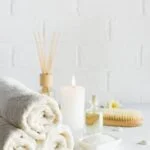Are you struggling to get a good night’s sleep? Many people turn to various methods and remedies to improve the quality of their sleep, including the use of aromatherapy. But, does sleep aromatherapy work? In this article, we will explore the concept of sleep aromatherapy, its science, popular essential oils for sleep, benefits of using aromatherapy, how to use it effectively, research and studies on its effectiveness, as well as expert tips and recommendations for better sleep.
Sleep aromatherapy is a natural approach to improving sleep quality by using essential oils derived from plants. These oils are believed to have therapeutic properties that can promote relaxation and induce better sleep. But is there any scientific evidence behind these claims?
In this comprehensive guide, we will delve into the science behind aromatherapy and its effect on sleep. We will also take a closer look at some popular essential oils used in aromatherapy for promoting better sleep.
Furthermore, we will discuss the potential benefits of using aromatherapy as a natural remedy for sleep issues. So if you have been wondering whether sleep aromatherapy is worth trying, read on to discover more about this age-old practice and its potential benefits for your sleep quality.
The Science Behind Aromatherapy and Sleep
The connection between aromatherapy and sleep is not just a matter of anecdotal evidence, but there’s a scientific basis to support it. Aromatherapy works by stimulating the olfactory system, which is connected to the part of the brain that controls emotions and memories. When specific essential oils are inhaled, they can have a calming and soothing effect on the mind and body, making it easier to relax and fall asleep.
One study published in the National Institutes of Health found that inhaling lavender essential oil improved the quality of sleep in individuals suffering from insomnia. Another study showed that inhaling the scent of jasmine was effective in reducing anxiety levels, which can contribute to better sleep quality. These findings suggest that there is indeed scientific evidence supporting the use of aromatherapy for promoting better sleep.
In addition, research has also shown that certain essential oils have sedative effects on the central nervous system. This means that these oils can help slow down brain activity, lower heart rate, and promote a sense of relaxation – all of which are important factors in preparing the body for sleep.
Popular Aromatherapy Essential Oils for Sleep
When it comes to using aromatherapy for sleep, there are several essential oils that are popular for their calming and sedative effects. These essential oils are known for their ability to promote relaxation and help individuals achieve a restful night’s sleep. Each of these essential oils has unique properties that target different aspects of sleep, making them a popular choice for those looking to improve their quality of rest through aromatherapy.
Lavender Essential Oil
Lavender is perhaps the most well-known essential oil for promoting relaxation and sleep. Its soothing, floral scent is commonly used in products designed to promote calmness, such as candles, lotions, and bath products. Research has suggested that lavender essential oil may help alleviate insomnia and improve overall sleep quality. Its calming effects can also reduce anxiety and stress, which are common culprits for keeping people awake at night.
Chamomile Essential Oil
Chamomile is another popular choice for promoting relaxation and aiding in better sleep. The sweet, herbaceous scent of chamomile essential oil is known for its calming effects on the mind and body. It has been used as a natural remedy for insomnia and anxiety for centuries. Chamomile essential oil can be diffused in the bedroom or added to a warm bath before bedtime to create a peaceful environment conducive to quality rest.
Sandalwood Essential Oil
Sandalwood is a versatile essential oil known for its calming and grounding properties. It has a rich, woody aroma that can help induce relaxation and create a serene atmosphere perfect for unwinding before bed. Sandalwood essential oil may also help alleviate symptoms of anxiety, tension, and restlessness, making it an excellent choice for those struggling with sleep issues.
These popular essential oils are just a few examples of the many options available for using aromatherapy to promote better sleep. Each one offers unique benefits that can contribute to creating an ideal environment for restful slumber. Whether used alone or in combination with other complementary oils, these aromatic essences can play a significant role in improving the quality of sleep naturally.
Benefits of Using Aromatherapy for Sleep
Aromatherapy has been used for centuries as a natural way to promote relaxation and improve sleep quality. Many people find that the use of essential oils can have a calming effect on the mind and body, making it easier to fall asleep and stay asleep throughout the night. There are several benefits to using aromatherapy for sleep, including:
- Stress Relief: Certain essential oils, such as lavender and chamomile, have been shown to have stress-relieving properties. Inhaling these scents can help to reduce anxiety and promote a sense of calm, making it easier to relax and drift off to sleep.
- Improved Sleep Quality: Aromatherapy has the potential to improve the overall quality of sleep by promoting deeper and more restful slumber. This can lead to waking up feeling more refreshed and alert in the morning.
- Natural Alternative: For those who prefer natural remedies over medications, aromatherapy provides a drug-free option for managing sleep difficulties. It is also a popular choice among individuals who are sensitive to synthetic fragrances or chemicals found in traditional sleep aids.
Research has shown that the use of certain essential oils may offer additional benefits beyond simply improving sleep quality. For example, some essential oils possess anti-inflammatory properties that may help with conditions such as snoring or sleep apnea. Additionally, the relaxing effects of aromatherapy can also contribute to lowering blood pressure, reducing heart rate, and easing muscle tension, all of which are beneficial for overall health and wellbeing.
In summary, while individual responses to aromatherapy may vary, many people do find significant benefits from using essential oils for improving their sleep quality. Whether through reducing stress levels or creating a calming environment conducive to better rest, aromatherapy offers a natural approach worth exploring for those seeking alternatives in their quest for improved sleep patterns.
How to Use Aromatherapy for Better Sleep
Aromatherapy can be a powerful tool for promoting better sleep and overall relaxation. There are several ways to incorporate aromatherapy into your bedtime routine to help you drift off more easily and improve the quality of your sleep.
Diffusion
One of the most common methods for using essential oils for sleep is through diffusion. This involves adding a few drops of your chosen essential oil to a diffuser, which then disperses the scent throughout the room. This allows you to breathe in the soothing aroma as you prepare for bed, creating a calm and peaceful environment that can help promote better sleep.
Topical Application
Another way to use aromatherapy for better sleep is through topical application. By diluting essential oils with a carrier oil such as almond or coconut oil, you can create a relaxing massage oil or body lotion. Simply apply the mixture to your pulse points, such as your wrists or temples, or massage it into your skin before bed to experience the calming effects of the essential oils.
Bed Linens and Pillows
You can also incorporate aromatherapy into your bedtime routine by spraying your bed linens and pillows with a homemade linen spray made with essential oils. By doing this, you can enjoy the soothing scent of your chosen essential oil as you drift off to sleep without needing any additional equipment. This simple method provides a subtle but effective way to reap the benefits of sleep aromatherapy.
By incorporating aromatherapy into your bedtime routine using one or more of these methods, you may experience improved relaxation and an easier time falling asleep. The key is to find what works best for you and experiment with different essential oils and application methods to determine what helps you achieve better sleep.
Research and Studies on the Effectiveness of Sleep Aromatherapy
There have been several research studies conducted to determine the effectiveness of sleep aromatherapy. One study published in the National Library of Medicine found that inhaling the aroma of lavender essential oil improved the quality of sleep for individuals suffering from insomnia. The participants reported feeling more relaxed and experiencing less anxiety, leading to better sleep patterns.
Another study from the University of Minnesota Medical School discovered that the scent of jasmine essential oil led to lower levels of anxiety and greater alertness upon waking up in the morning. This suggests that aromatherapy can not only improve sleep quality but also impact overall mental well-being.
Furthermore, a review published in Complementary Therapies in Clinical Practice evaluated multiple studies on aromatherapy for sleep and found that certain essential oils, such as lavender, chamomile, and valerian, were effective in promoting relaxation and improving sleep quality.
Overall, these research studies provide strong evidence that sleep aromatherapy does work in helping individuals achieve better quality sleep. The use of specific essential oils has shown promising results in reducing anxiety, promoting relaxation, and improving overall sleep patterns. With this scientific backing, incorporating aromatherapy into a bedtime routine may be beneficial for those struggling with insomnia or poor sleep quality.
Expert Tips and Recommendations for Using Sleep Aromatherapy
When it comes to using aromatherapy for better sleep, there are a few expert tips and recommendations to keep in mind. Here are some useful suggestions to help you make the most of this natural remedy:
1. Choose the Right Essential Oils: Not all essential oils are created equal when it comes to promoting better sleep. Lavender, chamomile, and bergamot are some of the most popular choices for their calming and relaxing properties. Consider trying different essential oils to find out which ones work best for you.
2. Use a Diffuser: One of the easiest ways to enjoy the benefits of aromatherapy for sleep is by using an essential oil diffuser. This device disperses the aroma throughout the room, creating a soothing environment that can help promote relaxation and restful sleep.
3. Practice Consistency: Like with any natural remedy, consistency is key when using aromatherapy for sleep. Try incorporating it into your nightly bedtime routine by diffusing essential oils, using them in a bath, or applying them topically before bedtime.
4. Mindful Application: When applying essential oils topically, it’s important to dilute them with a carrier oil and perform a patch test beforehand to avoid skin irritation. Additionally, be mindful of any potential allergies or sensitivities to specific oils.
5. Seek Professional Advice: If you have any underlying health conditions or concerns about using aromatherapy for sleep, it’s always best to consult with a healthcare professional or certified aromatherapist for personalized recommendations.
By following these expert tips and recommendations, you can enhance your chances of experiencing the benefits of sleep aromatherapy and improving the quality of your sleep naturally.
Conclusion
In conclusion, the question of “Does sleep aromatherapy work?” is not a simple yes or no answer. While there is scientific evidence to suggest that certain essential oils can have a positive impact on sleep quality, individual responses to aromatherapy may vary. The use of aromatherapy for better sleep has been popular for centuries and continues to be a widely used natural remedy for promoting relaxation and improving sleep.
The benefits of using aromatherapy for sleep are numerous, with many individuals reporting improved sleep quality, reduced insomnia symptoms, and increased feelings of relaxation and calmness. The calming effects of certain essential oils, such as lavender and chamomile, can help signal the brain to wind down and prepare for rest. Additionally, the act of incorporating a bedtime routine involving aromatherapy can also contribute to better sleep hygiene, further aiding in achieving a restful night’s sleep.
While there is ongoing research and studies on the effectiveness of sleep aromatherapy, it is important to note that individual experiences with aromatherapy will vary. It is recommended to consult with an aroma therapy expert or healthcare professional before integrating these practices into your nighttime routine.
Ultimately, whether sleep aromatherapy works for you will depend on your unique response to scents and relaxation techniques. Therefore, if you’re considering using aromatherapy for better sleep, it’s essential to approach it with an open mind and willingness to explore what works best for you personally.
Frequently Asked Questions
Does Aromatherapy Stress Relief Really Work?
Aromatherapy stress relief has been found to be effective for some people, but it is not a guaranteed cure-all. The use of certain essential oils can help promote relaxation and reduce stress levels, but individual responses may vary.
Is Aromatherapy Scientifically Proven?
The scientific evidence on the effectiveness of aromatherapy is mixed. While some studies suggest that certain essential oils can have a positive impact on mood and stress levels, more research is needed to fully understand the mechanisms behind these effects.
Is It OK to Sleep With Aroma Diffuser?
It is generally safe to sleep with an aroma diffuser, as long as it is used properly and with caution. Some essential oils may have sedative effects that could help improve sleep quality, but it’s important to use them in moderation and according to the manufacturer’s instructions.

Are you looking for a natural way to improve your health and wellbeing?
If so, aromatherapy may be the answer for you.





